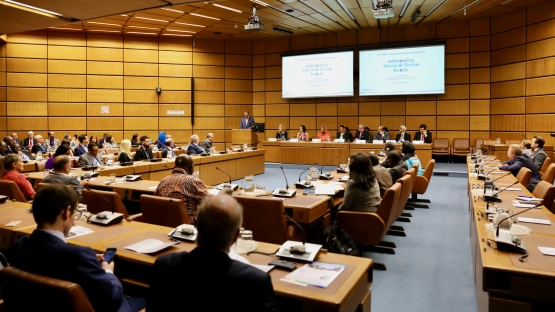During the plenary session of the General Conference 13 delegations delivered statements, which are available here.
Eleven countries have been newly elected to serve on the 35-member IAEA Board of Governors for the period 2019–2020.
The following side events took place on Thursday:
At the event Health Check: Applying Nuclear Safeguards at Radiopharmaceutical Facilities, delegates were informed about the IAEA analytical techniques for the verification of nuclear materials in facilities producing radiopharmaceuticals, pharmaceutical drugs that use radioactive compounds to diagnose or treat various diseases such as cancer.
At the New Edition of InTouch+ event, attendees heard about the web platform InTouch+, which is used for applications for technical cooperation events, such as training courses, including how this support will allow users to easily create and edit profiles, apply to events, and endorse and approve applications.
The event Capacity Building in Energy Planning and its Application for Addressing Sustainable Development and Climate Change Targets provided information on the IAEA programme for capacity building in energy planning and experience in its implementation.
At the event Recent Advances in Radiation Technologies, discussions focused on different irradiation methods using radioisotope sources, such as Cobalt-60, and other radiation technologies and the role of IAEA in supporting these technologies.
During the event, Nuclear Techniques for Preserving Cultural Heritage, delegates were provided an overview on how radiation technology is used to preserve and protect artefacts of cultural value, including statues, paintings and centuries of manuscripts.
At the IAEA's Legislative Assistance Programme: Addressing Member States’ Needs, a panel discussion highlighted the importance of establishing adequate regulatory control systems and implementing international obligations with the support of legislative assistance from the IAEA.
At the Global Energy Expenditure Data: Helping Countries Tackle Growing Obesity Crisis event, delegates witnessed the demonstration of the first comprehensive database on human energy expenditure. This database will help researchers look at the impact of growing sedentary lifestyles on dietary needs and whether energy expenditure has declined during the obesity epidemic.
At the Working in the IAEA Department of Safeguards event, attendees learned what it is like to work in nuclear safeguards, what candidate profile the IAEA looks for in safeguards staff, how the evaluation process for employing safeguards staff works.
The Transport Safety E-learning Initiatives event focused on the IAEA’s comprehensive e-learning course on the ‘safe transport of radioactive material’, which provides training for regulators, operators and anyone interested in the regulatory requirements for the safe transport of radioactive material by sea, air and land.
Member States activities
At the Indonesian event, South–South Cooperation: Promoting Capacity Building in Nuclear Science and Technology, developing countries showcased their efforts, with support from the IAEA, to strengthen cooperation through sharing of experience and lessons learned, and to accelerate capacity building through active engagement.
At the Hosting a Nuclear Facility: Perspectives from Local Communities event, organized by Canada, China, France, India, Japan, South Korea, Russian, the United Kingdom and the United, States, representatives of local communities hosting nuclear power plants or other nuclear fuel cycle facilities shared their views on the benefits and challenges of living near a nuclear installation.
At the Croatian event, Robotics and Automation Systems for Non-Destructive Examination (NDE) in Nuclear Power Plants, attendees heard about the advanced non-destructive examination and in-service inspection technology for nuclear power plants. The event also provided a platform for the exchange of experience among participants in the use of these tools.
The event Mainstreaming a Gender Perspective in the Nuclear Field: A Reflection on Concrete Future Steps, organized by Argentina, a panel of experts shared information about implementing gender mainstreaming in organizations, and proposed ideas during a round-table discussion on gender perspective in the nuclear workplace.
The Journey of Success of China in Geological Disposal of High Level Radioactive Waste event showcased the journey to success of the China–IAEA partnership in developing institutional infrastructure, human capacity and technical capabilities for geological disposal of high level radioactive waste.
The event Forum of Nuclear Regulatory Bodies in Africa (FNRBA): Annual Plenary Meeting, organized by Cameroon, discussed achievements from the past year and the Action Plan for the coming year. The meeting also addressed other topics related to the governance of the Forum and elect new office holders.
Other activities
The meeting of the Board of Representatives (ORA) of the Regional Cooperation Agreement for the Promotion of Nuclear Science and Technology in Latin America and the Caribbean (ARCAL) took place today. This is a yearly regular meeting of the representatives of the 21 State Parties of ARCAL, plus Spain.
IAEA designated the Thailand Institute of Nuclear Technology (TINT) as an IAEA Collaborating Centre to assist the IAEA in the implementation of activities in the field of water resources assessment and management for a period of four years.
As of today, there are 40 Collaborating Centres linked to areas covered by nuclear applications, nuclear energy and nuclear safety and security.
Country Programme Framework (CPF)
A CPF is the frame of reference for the medium-term planning of technical cooperation between a Member State and the IAEA and identifies priority areas where the transfer of nuclear technology and technical cooperation resources will be directed to support national development goals.
Abdulkadi Bakri Hamdan, Counsellor and Alternate Resident Representative, Permanent Mission of the State of Eritrea to the IAEA, and Dazhu Yang, IAEA Deputy Director General and Head of the Department of Technical Cooperation, signed Eritrea’s Country Programme Framework (CPF) for the period of 2019–2023.
Ibrahim Othman, Director General, Atomic Energy Commission of Syria, and Dazhu Yang, IAEA Deputy Director General and Head of the Department of Technical Cooperation, signed the Syrian Arab Republic’s Country Programme Framework (CPF) for the period of 2020–2025.





